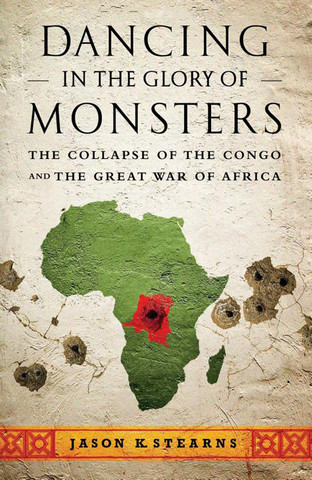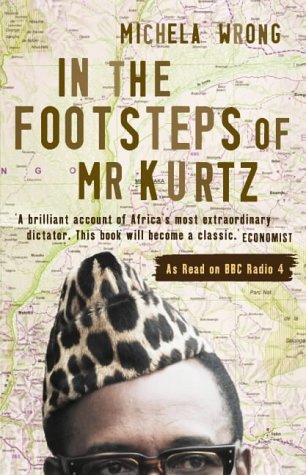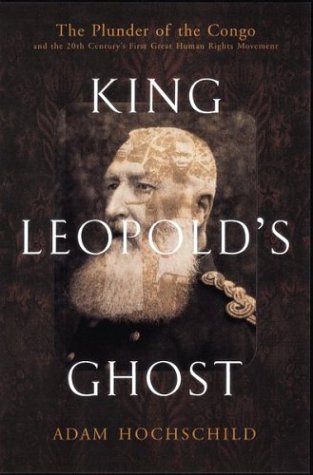 Dancing in the Glory of Monsters: The Collapse of the Congo and The Great War of Africa (2011) by Jason K. Stearns is the most recent account of Congo’s history between liberation and two civil wars (a conflict which continues to escalate in the eastern part of the country). Stearns’ holds no punches. This is a war journal coupled with first-hand accounts of hope amidst struggle for better days. After setting the book down, one is struck by two things: 1) the DRC’s utter vastness (it’s essentially the size of Western Europe, bordered by nine countries and home to Africa’s third largest city, Kinshasa) and, 2) “The Great War of Africa” which involved nine countries and included the loss of over 5 million lives – the deadliest conflict since World War II – so why haven’t we heard more about it?
Dancing in the Glory of Monsters: The Collapse of the Congo and The Great War of Africa (2011) by Jason K. Stearns is the most recent account of Congo’s history between liberation and two civil wars (a conflict which continues to escalate in the eastern part of the country). Stearns’ holds no punches. This is a war journal coupled with first-hand accounts of hope amidst struggle for better days. After setting the book down, one is struck by two things: 1) the DRC’s utter vastness (it’s essentially the size of Western Europe, bordered by nine countries and home to Africa’s third largest city, Kinshasa) and, 2) “The Great War of Africa” which involved nine countries and included the loss of over 5 million lives – the deadliest conflict since World War II – so why haven’t we heard more about it?
Stearns’ paints a complex story of warring countries, militia groups, and tribes all vying for means of power through control of land, waterways, capital and natural resources. It’s a clarion call to not over-simplify things – especially when it pertains to the Congo, Africa’s second largest country –as well as to look for signs of hope. Stearns concludes in his updated introduction with this reflection:
“The Congo is not just blood and gore. It also has an incandescent, raw energy to it, a dogged hustle that can be seen in street-side hawkers and besuited ministers alike… This is the paradox of the Congo: Despite it’s tragic past, and probably in large part due to the self-reliance and ingenuity resulting from state decay, it is one of the most alive places I know.”
 In the Footsteps of Mr. Kurtz: Living on the Brink of Disaster in Mobutu’s Congo (2001) by Michaela Wrong, is essentially a prequel to Stearn’s book. Wrong’s work is a dizzying first-hand account of the last days of Mobutu Sese Seko’s reign, juxtaposing hunger on the streets and decaying infrastructure with the dictator’s lavish lifestyle, European style luxuries in the capitol, and an elite class totally out of touch with the needs and dreams of the majority of Zairians/Congolese. It’s a great read, not only because of Wrong’s tireless efforts to uncover corruption and graft, but her care and attention to share stories from the industrious, artful friends she meets along the way. There’s also a story on Africa’s second largest nuclear reactor that you can’t miss.
In the Footsteps of Mr. Kurtz: Living on the Brink of Disaster in Mobutu’s Congo (2001) by Michaela Wrong, is essentially a prequel to Stearn’s book. Wrong’s work is a dizzying first-hand account of the last days of Mobutu Sese Seko’s reign, juxtaposing hunger on the streets and decaying infrastructure with the dictator’s lavish lifestyle, European style luxuries in the capitol, and an elite class totally out of touch with the needs and dreams of the majority of Zairians/Congolese. It’s a great read, not only because of Wrong’s tireless efforts to uncover corruption and graft, but her care and attention to share stories from the industrious, artful friends she meets along the way. There’s also a story on Africa’s second largest nuclear reactor that you can’t miss.
 Finally, the most well-known western account on Congo history is likely King Leopold’s Ghost: A Story of Greed, Terror, and Heroism in Colonial Africa (1998) by Adam Hochschild. Coupled with Hochschild’s Bury the Chains history on abolition in the British colonies, it is one of the most important books written in the past few years. When looking at the history of Africa, one can’t forget the ties to colonialism and the expansive growth of economies in the global north. The story, specifically of Belgian Congo, and the Congo Free State, outlines in graphic, careful detail, the exploitation of the colonized by King Leopold II, who held only nominal power in Belgium but ruled the Congo as a ruthless, if absent, dictator. Leopold’s Ghost not only is a gruesome account of Belgian plundering and abuse of the people in “the heart of Africa” but recovers a meaningful and moving narrative of local African leaders and expatriate missionaries. These local leaders and missionaries awakened hearts and minds abroad to mobilize as part of the 20th century’s first global human rights movement. It’s an important story for people of prayer and activism today: we can mobilize to end great, horrifying realities.
Finally, the most well-known western account on Congo history is likely King Leopold’s Ghost: A Story of Greed, Terror, and Heroism in Colonial Africa (1998) by Adam Hochschild. Coupled with Hochschild’s Bury the Chains history on abolition in the British colonies, it is one of the most important books written in the past few years. When looking at the history of Africa, one can’t forget the ties to colonialism and the expansive growth of economies in the global north. The story, specifically of Belgian Congo, and the Congo Free State, outlines in graphic, careful detail, the exploitation of the colonized by King Leopold II, who held only nominal power in Belgium but ruled the Congo as a ruthless, if absent, dictator. Leopold’s Ghost not only is a gruesome account of Belgian plundering and abuse of the people in “the heart of Africa” but recovers a meaningful and moving narrative of local African leaders and expatriate missionaries. These local leaders and missionaries awakened hearts and minds abroad to mobilize as part of the 20th century’s first global human rights movement. It’s an important story for people of prayer and activism today: we can mobilize to end great, horrifying realities.
So, for us, as we spend time with our sisters and brothers in Congo this week, it’s important for us to remember. Remember history, remember to listen to all our interlinking stories, and remember that we can mobilize together and break the backs of great injustices in our own day. How will we break the cycle of extreme poverty together? By remembering our shared human complexities; each of us doing our part.




One Response to “The 75th Anniversary Congo Trip: A Booklist Part One”